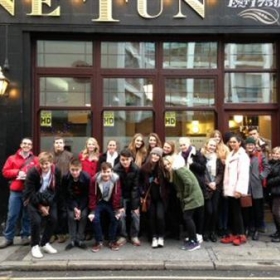A literary journey through London...
Published on isbi School News dated Tuesday 14th of January 2014
At the end of the Christmas Quarter, nineteen Sixth Form pupils from Oundle School gathered outside Westminster Abbey to embark on a literary journey around London.Pupil, Emma Kemsley-Pain (17) commented, 'Our English teacher, Mr Hipperson's enthusiasm was infectious. In Westminster Abbey, the vast majority made a bee-line for Poets' Corner, where we were able to view both the resting places and the memorials to some of the literary figures who have had such a huge impact on British culture and its evolution.'
From the remains of Chaucer, the pupils began a journey through London as the 'Father of the English Language' himself would have seen it.
Emma added, 'Walking along the Strand in an attempt to imagine peaceable green fields and tranquil countryside while the hubbub of London surrounded us was tricky to say the least, but we were inspired by the images Mr Hipperson created.'
The afternoon brought with it the opportunity to visit UCL, a university which many of the Lower Sixth pupils are considering as a prospective university. The group were fortunate to enjoy a lecture on Chaucer delivered by Dr Marilyn Corrie during their visit. Dr Corrie gave them an insight into how Chaucer created celebrity status for himself, which had never happened before in the world of literature. It was this status that immortalised him as a figurehead for British literature, Dr Corrie claimed, and not the actual quality of his writings, which was similar to many of his contemporaries.
English teacher, Harriet Hopper commented, 'Debates and interpretations regarding Chaucer's texts quickly ensued and this proved to be a very stimulating afternoon.'
Whilst several members of the group continued the walking tour some went ice-skating at Somerset House. Reconvening at the Garrick Theatre, pupils enjoyed a gripping production of '12 Angry Men'.
The following morning the group met up at The Dickens Museum.
Emma added, 'Whilst studying an author it is rare to get such a valuable glimpse into their life. The museum provided context and depth to those currently studying Dickens and incited interest in those who are not.'
The tour was followed by a guided walk through Dickensian London, in particular through the streets through which Dickens walked, in order to stimulate inspiration for Oliver Twist, which helped pupils begin to comprehend the poverty stricken London that Dickens knew: a London rife with disease, famine and cruelty.
The afternoon was dedicated to William Shakespeare. Standing on a traffic island by the Barbican doesn't seem to be an event noteworthy in any respect yet it was in this spot that it is thought Shakespeare wrote Othello. Pupils stood marvelling at the relatively nondescript area which had sent shockwaves through Britain.
Their next stop was the Globe, at which they were given a tour by a very knowledgeable, if slightly eccentric, tour guide, learning vast amounts about the reality of theatre during Shakespeare's lifetime and the practicalities of being a playwright: what people want, their expectations and catering to an audience of every echelon of society.
The final morning began at the British Library with a fascinating workshop on 'Ways of Reading'. This absorbing talk, given by Julian Walker, encouraged those studying English to consider how they read and how this affects their experience. They were challenged to think about the author's intentions when penning a work of literature and whether these intentions ought to supersede the reader's prerogative to read flexibly. They were also given the opportunity to do some analytical work from the original manuscripts and first editions of Wilde, Wordsworth, Shakespeare and Hardy which provoked thought on how a text evolves through time according to the author's passage through life and whether this is also the case with the reader.
Emma concluded, 'The trip concluded with a trip to Keats' house in Hampstead. As with the Dickens museum, we were able to ascertain valuable context which we would never have got the chance to learn otherwise. The trip was certainly a very valuable experience; providing depth and breadth to our knowledge and understanding of the quintessential British literary figures and their significance.'


